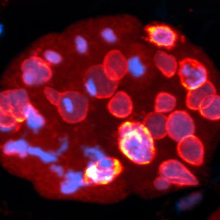Cell biology of brain cells
Our research, at the interface of fundamental cell biology and neurobiology, is focused on how fundamental properties of eukaryotic cells have been adapted and specialized to support the unique functions of the nervous system, including cognition. We study, in particular, the traffic and dynamics of cell membranes, with emphasis on their role in synaptic transmission. We are also interested in how molecular perturbations that affect membrane dynamics result in neurological diseases including neurodegenerative diseases such as Parkinson. To address these questions we use in a synergistic way biochemistry, cell free reconstitution, advanced light and electron microscopy and gene editing techniques, as well as a variety of experimental systems including model cell lines, primary neuronal cultures, iPSC-derived neurons and glia, and mice.
Methods
Topics
Biography
De Camilli earned his M.D. degree from the University of Milano (Italy), was a postdoctoral fellow in the Department of Pharmacology at Yale, and subsequently an assistant professor in the Yale Section of Cell Biology. Following a brief return to Milan, he moved back to Yale in 1988, where he has been an HHMI Investigator since 1992 and served as Chair of the Department of Cell Biology (1997-2000), co-founding Director of the Yale Program in Cellular Neuroscience, Neurodegeneration and Repair (2005-present), chair of the Department of Neuroscience (2015-2021) and Director of the Kavli Institute for Neuroscience (2015-2022). His interest in science is an extension of his love for nature in all its manifestations


